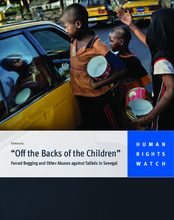At least 50,000 children attending hundreds of residential Quranic schools, or daaras, in Senegal are subjected to conditions akin to slavery and forced to endure often extreme forms of abuse, neglect, and exploitation by the teachers, or marabouts, who serve as their de facto guardians. By no means do all Quranic schools run such regimes, but many marabouts force the children, known as talibés, to beg on the streets for long hours—a practice that meets the International Labour Organization’s (ILO) definition of a worst form of child labor—and subject them to often brutal physical and psychological abuse. The marabouts are also grossly negligent in fulfilling the children’s basic needs, including food, shelter, and healthcare, despite adequate resources in most urban daaras, brought in primarily by the children themselves.
In hundreds of urban daaras in Senegal, it is the children who provide for the marabout. While talibés live in complete deprivation, marabouts in many daaras demand considerable daily sums from dozens of children in their care, through which some marabouts enjoy relative affluence. In thousands of cases where the marabout transports or receives talibés for the purpose of exploitation, the child is also a victim of trafficking.
The Senegalese and Bissau-Guinean governments, Islamic authorities under whose auspices the schools allegedly operate, and parents have all failed miserably to protect tens of thousands of these children from abuse, and have not made any significant effort to hold the perpetrators accountable. Conditions in the daaras, including the treatment of children within them, remain essentially unregulated by the authorities. Well-intentioned aid agencies attempting to fill the protection gap have too often emboldened the perpetrators by giving aid directly to the marabouts who abuse talibés, insufficiently monitoring the impact or use of such aid, and failing to report abuse.
Moved from their villages in Senegal and Guinea-Bissau to cities in Senegal, talibés are forced to beg for up to 10 hours a day. Morning to night, the landscape of Senegal’s cities is dotted with the sight of the boys—the vast majority under 12 years old and many as young as four—shuffling in small groups through the streets; weaving in and out of traffic; and waiting outside shopping centers, marketplaces, banks, and restaurants. Dressed in filthy, torn, and oversized shirts, and often barefoot, they hold out a small plastic bowl or empty can hoping for alms. On the street they are exposed to disease, the risk of injury or death from car accidents, and physical and sometimes sexual abuse by adults. In a typical urban daara, the teacher requires his talibés to bring a sum of money, rice, and sugar every day, but little of this benefits the children. Many children are terrified about what will happen to them if they fail to meet the quota, for the punishment—physical abuse meted out by the marabout or his assistant—is generally swift and severe, involving beatings with electric cable, a club, or a cane. Some are bound or chained while beaten, or are forced into stress positions. Those captured after a failed attempt to run away suffer the most severe abuse.
Marabouts who exploit children make little to no effort to facilitate even periodic contact between the talibés and their parents. The vast majority of talibés never speak with their families. In many cases, preventing contact appears to be a strategy employed by the marabout.
Countries from which a large number of talibés are sent to Senegal, particularly Guinea-Bissau, have likewise failed to protect their children from the abuse and exploitation that await them in many urban Quranic schools in Senegal. The Bissau-Guinean government has yet to formally criminalize child trafficking and, even under existing legal standards, has been unwilling to hold marabouts accountable for the illegal cross-border movement of children. Guinea-Bissau has also failed domestically to fulfill the right to education—around 60 percent of children are not in its school system—forcing many parents to view Quranic schools in Senegal as the only viable option for their children’s education.
Parents and families, for their part, often send children to daaras without providing any financial assistance. After informally relinquishing parental rights to the marabout, some then turn a blind eye to the abuses their child endures. Many talibés who run away and make it home are returned to the marabout by their parents, who are fully aware that the child will suffer further from forced begging and often extreme corporal punishment. For these children, home is no longer a refuge, compounding the abuse they endure in the daara and leading them to plan their next escapes to a shelter or the street.
Without enforced regulation of daaras and success on accountability, the phenomenon of forced child begging will continue its decades-long pattern of growth. Human Rights Watch reports that if the Senegalese government wants to retain its place as a leading rights-respecting democracy in West Africa, it must take immediate steps to protect these children who have been neglected by their parents and exploited and abused in the supposed name of religion.

